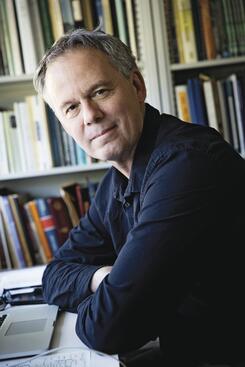Timothy Lyons, distinguished professor of biogeochemistry, is now even more distinguished as this year’s winner of The Geological Society of America’s prestigious Arthur L. Day medal.
The society is a professional organization with 20,000 members from more than 100 countries. These individuals study planetary mysteries and histories and gather to share their findings. The Arthur L. Day medal is one of the highest honors the organization can bestow, and it is given annually to only one person.
This year, that person is Lyons, who said he is honored to receive it.
“I’m deeply humbled when I look at the list of previous recipients. That group goes back almost 75 years and includes many of my geochemical heroes, including my late, great, graduate advisor at Yale University, Robert Berner, as well as a couple of Nobel Prize winners,” Lyons said.
The medal’s namesake, Arthur L. Day, was the founding director of the Carnegie Institution of Washington’s Geophysical Laboratory. It was Day’s wish that the award, which he established in 1948, serve both as recognition of outstanding achievement in geologic research, and as inspiration for further research efforts.
Lyons was nominated for the award by Kurt Konhauser, professor of geobiology and geomicrobiology at the University of Alberta.
“Tim is widely regarded as the world leader in developing and applying innovative proxies for tracking chemical changes in the rock record from the period in which oxygen first appeared on Earth,” Konhauser said.
“His research has also demonstrated that the present-day richness and diversity of life is the result of billions of years of gradual changes in biogeochemical cycles and biosphere evolution that incrementally transformed our planet’s surface conditions.”
Understanding these periods, billions of years ago, when oxygen was lacking in our own atmosphere offer clues about the potential signs of life on other planets, where oxygen may also be in limited supply.
Because of their immense distance from us, humans will likely never visit many if any planets beyond our own solar system. However, with advanced telescope technology, scientists can learn much about the composition of other planets’ atmospheres.
Lyons leads one of the NASA Astrobiology Program’s eight new research teams. His team uses Earth’s history spanning billions of years to develop new ways of finding and interpreting gases around planets elsewhere in the galaxy that could signify the presence of living organisms.
“As the field of astrobiology grew at NASA, so did our realization that the many chapters of Earth’s history, or alternative Earths, provide wide-ranging templates in the search for life in our galactic neighborhood far beyond our solar system,” Lyons said.
With this medal, Lyons is inspired to continue not only his own research, but also to further fuel his commitment to his colleagues and students in the Department of Earth and Planetary Sciences and elsewhere on campus, including those working with him to solve problems at the Salton Sea.
“More than anything, this award is a reminder of how truly fortunate I’ve been to work with so many outstanding colleagues, on and off the UCR campus, including a long list of highly accomplished students and postdocs,” Lyons said. “They are my greatest source of pride and gratitude.”
Comments from colleagues echo the gratitude that Lyons feels for his collaborators.
“Tim is at the top in terms of his dedication, support, and mentorship of students at all career stages. As a colleague who has worked closely with some of his former graduate students, it becomes readily apparent that they try to emulate Tim in their open approach to scientific collaboration, willingness to ask the big questions, and creativity to take their ideas in different directions,” Konhauser said.
Lyons will formally receive his medal at the Geological Society’s awards ceremony on Oct. 9 in Denver, Colorado.
